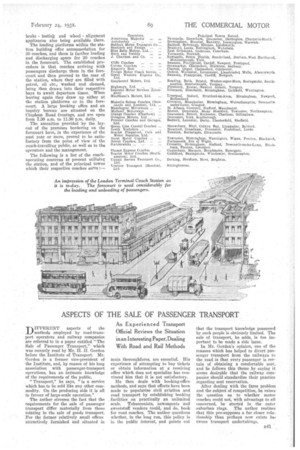ASPECTS OF THE SALE OF PASSENGER TRANSPORT An Experienced Transport
Page 75

If you've noticed an error in this article please click here to report it so we can fix it.
Official Reviews the Situation man Interesting Pape, Dealing With Road and Rail Methods 1-)LIFFERENT aspects of the .I.Jmethods employed by road-transport operators • and railway companies are referred to in a paper entitled "The Sale of Passenger Transport," which was recently read by Mr. H. H. Gordon before the Institute of Transport. Mr. Gordon is a former vice-president of the Institute, and, by reason of his long association with passenger-transport operations, has an intimate knowledge of the requirements of the public_
"Transport," he says, "i5 a service which has to be sold like any other commodity. On the producing side it is all in favour of large-scale operation."
The author stresses the fact that the requirements for the sale of passenger transport differ materially from those relating to the sale of goods transport. For the formerrelatively small offices attractively furnished and situated in main thoroughfares, are essential. His experience of attempting to buy tickets or obtain information at a receiving office which dOes not specialize has convinced him that it is not satisfactory.
He then deals with booking-office methods, and says that efforts have been made to popularize civil aviation and road transport by establishing booking facilities on practically an unlimited scale. Tobacconists, newsagents and sweststuff vendors could, and do, book for road coaches. The author questions whether, in the long run, this policy is in the public interest, and points out
that the transport knowledge possessed by such people is obviously limited. The sale of transport, he adds, is too important to be made a side issue. in Mr. Gordon's opinion, one of the reasons which has helped to divert passenger transport from the railways to the road is that every passenger is certain of obtaining a comfortable seat, and he follows this theme by saying it seems desirable that the railway companies should standardize their practice regarding seat reservation.
After dealing with the fares problem and the subject of competition, he raises the question as to whether motor coaches could not, with advantage to all concerned, be started in the outer suburban rings. The author realizes that this pre-supposes a far closer relationship than perhaps now exists between transport undertakings.




















































































































